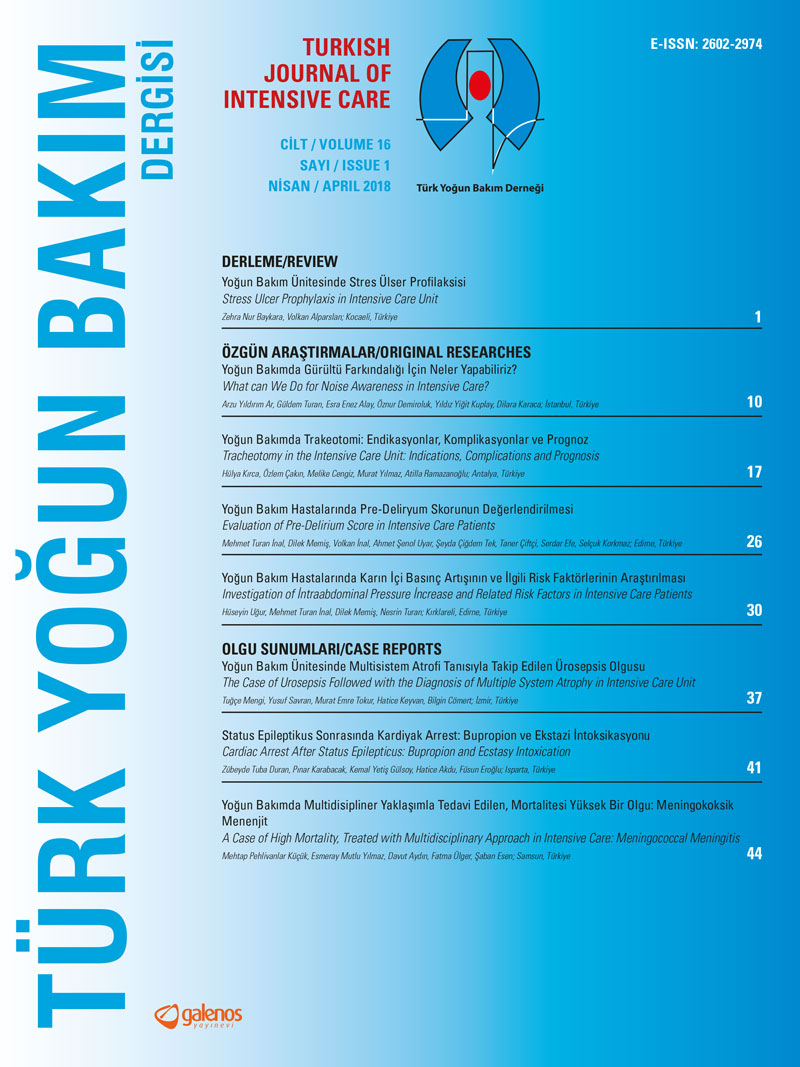Abstract
Multiple system atrophy (MSA) is an adult-onset, sporadic, idiopathic, a rarely seen neurodegenerative disease. MSA is clinically characterized by a variable combination of autonomic dysfunction, parkinsonism, cerebellar ataxia and pyramidal symptoms. One of the symptoms of autonomic dysfunction is orthostatic hypotension. Orthostatic hypotension can worsen due to sepsis and severe hypotension requiring intravenous vasopressor therapy can develop. If these patients are dependent on vasopressors, long-term treatment options must be considered. One of the treatment options is pyridostigmine. Pyridostigmine is a cholinesterase inhibitor recently started to be used in the treatment of orthostatic hypotension. In this case report, we presented a patient admitted to our intensive care unit with the diagnosis of urosepsis in whom vasopressor dependent hypotension due to MSA developed. Although the findings of sepsis were retreat in the follow-up, the need for vasopressor continued. Pyridostigmine was used to correct hypotension associated with autonomic dysfunction in this patient resistant to weaning from vasopressors. Increasing of the pyridostigmine dose to 180 mg/day resulted in stabilization of the mean arterial pressure and the vasopressor therapy was gradually reduced and discontinued.
Keywords: Autonomic dysfunction, intensive care unit, multiple system atrophy
Giriş
Multisistem atrofi (MSA) erişkin dönemde başlayan, ilerleyici, sporadik, nedeni bilinmeyen nörodejeneratif bir hastalıktır (1). Klinik olarak otonomik disfonksiyon, parkinsonizm, serebellar ataksi ve piramidal bulguların değişken kombinasyonları ile karakterizedir (2). Birçok heterojen hastalık gibi yıllar süren süreçte MSA tanımlaması tartışmalara yol açmıştır. Günümüzde yaygın olarak kullanılan sınıflamada MSA, parkinsoniyan tip ve serebellar tip olmak üzere ikiye ayrılmaktadır (1). Ancak MSA’lı hastaların seyirleri sırasında sıklıkla otonomik disfonksiyon geliştirmektedir. Otonomik disfonksiyonun baskın semptom olduğu hastalarda tanımlamanın nasıl yapılacağı konusunda çelişkiler mevcuttur. Horimoto ve ark. (3) otonomik semptomların predominant olduğu MSA hastalarının, otonomik tip olarak sınıflandırılması gerektiğini belirtmişlerdir. İnsidansının yılda 0,6/100,000 ve prevalansının 1,86-4,9/100,000 olması göz önünde bulundurulduğunda MSA oldukça nadir görülen bir hastalıktır (2). Nadir görülmesi ve yoğun bakım koşullarında takibi sırasında bazı kritik noktaların olması nedeniyle bu yazıda ürosepsis tanısıyla dahiliye yoğun bakım ünitesine yatırılan otonomik semptomların ön planda olduğu MSA olgusu literatür eşliğinde sunuldu.
Olgu Sunumu
Altmış bir yaşında erkek hasta, bilinç bozukluğu ve ateş yüksekliği nedeniyle acil servise getirilmiş. Yapılan kan gazı incelemesinde pH: 7,27, PaCO2: 81,6 mmHg, PaO2: 30,1 mmHg olarak saptanması üzerine acil olarak entübe edilen hasta dahiliye yoğun bakım ünitesine yatırıldı. Ateş yüksekliği, özgeçmişinde idrar yolu enfeksiyonu (Pseudomanas aeroginosa) olan hastanın kültürleri alındı, sepsise bağlı organ yetmezliği değerlendirmesi skoru (sepsis releated organ failure assessment) 3 olan hasta ürosepsis olarak değerlendirildi. Ampirik antibiyoterapi (piperasilin-tazobaktam) başlandı. Laktat düzeyi 3,7 mmol/L ve kan basıncı 70/40 mmHg olan hastaya parenteral %0,9 NaCl (30 mL/kg/2 saat) başlandı. Sıvı tedavisine rağmen arter kan basıncı ≤65 mmHg olması nedeniyle vazopressör (noradrenalin) tedavi başlandı. İnvazif kan basıncı takiplerine göre vazopressör dozu arttırıldı. Vital bulguları stabil hale gelen hastada nörolojik sistem dışında diğer sistem muayenelerinde anlamlı patoloji saptanmadı. Nörolojik muayenesinde göz hareketlerinde solda daha belirgin bilateral abdüksiyon kısıtlılığı, bradimimi, bilateral ekstansör plantar yanıt, alt ekstremitede artmış derin tendon refleksleri, 4 ekstremitede de rijidite ve kontraktür saptandı. Belirgin kontraktür nedeniyle motor muayene ve serebellar muayene net olarak değerlendirilemedi. Hastanın özgeçmişi detaylı sorgulandığında yakınmalarının 13 sene önce konstipasyon, empotans ve ayağa kalktığında olan halsizlik ile başladığı takip eden yıllarda ürolojik, serebellar, parkinsoniyal ve piramidal bulgular eklendiği, disfajisinin ağırlaşması nedeniyle perkütan endoskopik gastrostomi (PEG) tüpü takıldığı, idrar retansiyonu nedeniyle önce temiz aralıklı kataterizasyon uygulandığı, uyum sağlamaması nedeniyle foley sonda takıldığı öğrenildi. MSA tanısı koyulurken nörogörüntüleme yapıldığı, kraniyal manyetik rezonans görüntülemede (MRG) kortikal ılımlı atrofi saptandığı görüldü. Farmakolojik tedavisi sorgulandığında parkinsoniyal bulguları nedeniyle levodopa ve ortostatik hipotansiyonu nedeniyle indometazin kullandığı ancak bu tedavilerin bir süre sonra kesildiği öğrenildi. Laboratuvar incelemelerinde lökosit 13,300/mm3, nötrofil 11,400/mm3, total protein 6,16 g/dL, albümin 3,12 g/dL, prokalsitonin 0,28 ng/mL, tam idrar tetkikinde her sahada bol lökosit saptandı. Akciğer grafisinde anlamlı patolojik bulgu saptanmadı. Elektrokardiyogramı sinüs ritmindeydi, ST değişikliği yoktu. Ekokardiyografide ejeksiyon fraksiyonu %60 idi, sol ventrikül duvar hareket kusuru yoktu. Kraniyal bilgisayarlı tomografide (BT) kortikal atrofinin yanı sıra posterior fossada atrofi saptandı. PEG tüpünden hastanın enteral beslenmesine devam edildi. Stres ülser profilaksisi ve tromboemboli profilaksisi başlandı. İdrar kültüründe P. aeroginosa ve Klebsiella pneumonaie üremesi oldu, üreyen bakteriler piperasilin-tazobaktama duyarlı olduğu için mevcut antibiyotiğe devam edildi. Kontrol idrar kültüründe üreme saptanmayan ve sepsis bulguları gerileyen hastanın antibiyoterapisi kesildi. Ancak sepsis bulgularının gerilemesine ve hastanın bilincinin açık olmasına rağmen noradrenalin infüzyon ihtiyacı devam etti. Hastaya yeterli sıvı tedavisi uygulanmasına rağmen vazopressör desteği (0,2 mcg/kg/dk) olmadan ortalama arter basıncı 65 mmHg üzerine çıkartılamadı. Bu nedenle dopamin infüzyonuna başlanmasına, noradrenalin infüzyonunun azaltılarak kesilmesine karar verildi. Ancak hem vazopressör hem de inotrop desteği azaltıldığında hastanın idrar çıkışında azalma ve bilinç durumunda değişiklik saptandı. Sıvı tedavisi ekokardiyografi bulguları (vena cava inferior çapı ve kollaps miktarı) ile düzenlendi. Özgeçmişinde ortostatik hipotansiyon tanısı olan hastada sepsisin otonomik disfonksiyonu kötüleştirdiği düşünüldü. Yoğun bakımda takip edilen kritik hasta olması nedeniyle hipotansiyon için indometazine devam edilmedi, destek tuz alımı artırıldı (1,5 gr/gün), midodrin başlanması planlandı. Midodrin ülkemizde ruhsatlı olarak bulunmadığı için yurt dışından ilaç temini için rapor çıkartıldı. İlaç temininin en az 1 ay süreceği öğrenildi bu nedenle piridostigmin düşük dozda başlandı, yanıt alınamayınca doz artırıldı, maksimum 180 mg/gün’e çıkıldı. Ortalama arter basıncının >65 mmHg olması üzerine noradrenalin infüzyonu azaltılarak kesildi. Belirgin CO2 retansiyonuna rağmen apneleri olması nedeniyle primer hastalığına bağlı santral solunum merkezinde etkilenme olabileceği düşünüldü. Solunum dürtüsünün azalması nedeniyle hastanın mekanik ventilatöre bağlı kalacağı göz önünde bulundurularak yatışının 6. gününde trakeotomi açıldı, hastanın ev tipi ventilatör ile taburcu olmasına karar verildi. Hastaya yattığı süre boyunca göğüs ve kas-iskelet sistemine yönelik fizyoterapi desteği verildi. Yatak yaraları oluşmaması için sık pozisyon değişimine ve beslenmesine özen gösterildi. Hasta yatışının 42. gününde taburcu edildi. Olgu bilgilendirildi ve onamı alındı.
Tartışma
MSA, tipik olarak 50 yaş civarında başlayan, kadın ve erkekleri eşit oranda etkileyen ve sporadik olarak ortaya çıkan bir sinükleopatidir (4). Hastalığın başlangıcı, motor (parkinsonizm veya serebellar) veya otonomik özelliklere göre tanımlanır (2). Olgumuzda yakınmalar konstipasyon, empotans ve ayağa kalktığında olan halsizlik şeklinde başlamış olup hastalığın başlangıcında baskın bulgu otonomik disfonksiyondur. Yoğun bakım takipleri sırasında yapılan nörolojik muayenelerde otonomik disfonksiyon, parkinsoniyal, serebellar ve piramidal bulgular heterojen şekilde mevcuttu. MSA’da disotonomik bulgular ortostatik hipotansiyon, postprandiyal hipotansiyon, supin hipertansiyon, termoregülasyon bozukluğu nedeniyle anhidrozis, lakrimasyon ve salivasyonda azalma, konstipasyon, empotans, idrar inkontinansı ve mesanenin tam boşaltılamamasıdır (5).
MSA’da parkinsoniyal, piramidal, serebellar bulguların yanı sıra respiratuvar bulgular da saptanabilir. Stridor, bilateral vokal kord paralizisi, açıklanamayan santral solunum yetmezliği, santral ve obstrüktif uyku apne durumları MSA’da görülen respiratuvar bulgulardır (6,7). Uyku apnesi, ani ölümlere neden olabilir. Ani ölüm hem beyin sapı solunum merkezinin hasarı hem de laringeyal distoninin neden olduğu üst hava yolu obstrüksiyonu ile sonuçlanan obstrüktif uyku apnesi ile ilişkilidir (7,8). MSA tanısı klinik özelliklere dayanır. Putamen, pons ve orta serebellar pedinkülde atrofi ile T2 sekanslarda lateral putamende hipointensite ve ponsta “cross sign” denilen haç şekline benzeyen hiperintensiteler gibi MR bulguları tanıyı destekler (9). Olgumuzun MSA tanısı sırasında çekilen kraniyal MRG’sinde posterior fossada atrofi belirgin değilken yeni çekilen kraniyal BT’sinde beyin sapı ve serebellumda atrofinin belirginleştiği dikkati çekmiştir. Bu durum bize hastalığın progresyonunu düşündürdü. MSA gibi nörodejeneratif hastalıklarda hastalığın seyri sırasında yoğun bakım gereksinimi olabilir (10). Bu hastaların yoğun bakım yönetiminde dikkat edilmesi gereken bazı kritik noktalar bulunmaktadır. Ne yazık ki literatürde gerek Parkinson hastalığı gerekse de MSA tanısı ile yoğun bakım ünitesinde takip edilen hastalarla ilgili yeterli sayıda çalışma bulunmamaktadır (11). Yoğun bakım ünitesinde takip edilen MSA hastalarında medikal tedavinin düzenlenmesinde sorun yaşanmaktadır. Bu hastaların bir kısmında mevcut olan kognitif etkilenme ve disfaji, akut hastalık nedeniyle kötüleşebilir (12). Bir kısmında ise mekanik ventilatör desteği nedeniyle oral beslenme mümkün olmamaktadır (10). Nazogastrik tüp ya da PEG tüpü ile ilaçlar enteral olarak verilebilir. Buradaki başlıca sorun MSA hastalarında antiparkinsoniyal tedavi için kullanılan levodopa içeren kombinasyon preparatlarının ezilmesi sonucu ilaç farmakokinetiğinin değişmesidir. Yurtdışında mevcut olan levodopa-karbidopa hemen salım tabletlerinde bu sorun yaşanmamaktadır (12), ancak bu tabletler Türkiye’de bulunmamaktadır. MSA hastalarının yoğun bakım takipleri sırasında karşımıza çıkan diğer bir problem ise bradikinezi, rijidite ve postür anomalileri nedeniyle bu hastaların derin ven trombozuna daha yatkın olmasıdır (13). Rijidite, bradikinezi, postür anomalisi gibi parkinsoniyal semptomları olan hastalarda derin ven trombozuna yönelik farmakolojik ve mekanik yöntemlerle önlem alınması gerekmektedir. Ayrıca rehabilitasyona erken başlanması da önemlidir. Otonomik semptomları olan MSA hastalarında anestezik ajanlar açısından dikkatli olmak gerekmektedir; anestezik ajan kullanıldığında bu hastalarda ani hipotansiyon gelişebileceği akılda tutulmalıdır (14). Trakeotomi yoğun bakım hastalarında yaygın uygulanan bir prosedürdür. Belirgin CO2 retansiyonuna rağmen apneleri olan olgumuza, MSA’nın yaşamı tehdit eden solunumsal komplikasyonları göz önünde bulundurularak erken dönemde trakeotomi uygulandı. Unutulmaması gereken nokta; trakeotomi uygulanmasına rağmen MSA hastalarında uyku sırasında respitatuvar ritim bozukluğu nedeniyle ani ölüm görülebileceğidir (6). Bu nedenle MSA hastaları dikkatli değerlendirilip respitatuvar ritim bozukluğu şüphesi varlığında hasta ev tipi mekanik ventilatör ile taburcu edilmelidir. Yoğun bakım hastalarında sepsis karşımıza çıkan en büyük sorunlardan biridir. Sepsiste sempatik modulasyonda ve barorefleks aktivitesinde bozulma gibi nedenlerle otonomik disfonksiyon gelişebileceği bildirilmiştir (15). MSA, Guillain-Barré sendromu, amiloidoz gibi otonomik yetmezliği bulunan hastalarda, sepsis ortostatik hipotansiyonu kötüleştirebilir ve intravenöz vazopressör gerektiren ağır hipotansiyona neden olabilir (16). Bu hastaların normotansiyon sağlanamadığı için vazopressörlere bağımlı kalması durumunda, ortostatik hipotansiyon tedavisinde kullanılan uzun vadeli tedavi seçenekleri düşünülmelidir (16). MSA’da tedavi, başlıca parkinsonizm ve otonomik disfonksiyona yönelik semptomatik tedavidir, şu an için hastalığın efektif nöroprotektif tedavisi yoktur (2). Parkinsonizm için levodopa kullanılabilir, klinik serilerde levodopa yanıtının %40’tan fazla olduğu belirtilmiştir ancak ne yazık ki bu yanıt hastalarının birçoğunda geçicidir (4,17). Dopamin agonisti ve levodopa ortostatik hipotansiyonu kötüleştirebilir veya provake edebilir (4). Otonomik disfonksiyon bulgularından ortostatik hipotansiyon için tuz ve su alımının artırılması, elastik çorap ve başın gece yatarken 30 derece yükseltilmesi önerilir (4). Farmakolojik tedavi yukarda belirtilen önlemlere rağmen kontrol altına alınamayan semptomatik hastalarda gündeme gelmelidir; bu amaçla fludrokortizon, midodrin, droksidopa, klonidin kullanılabilir (4). Ortostatik hipotansiyon için ilk seçenek ilaçlar olan fludrokortizon ve midodrin ne yazık ki ülkemizde ruhsatlı değildir. Piridostigmin ortostatik hipotansiyon tedavisinde gündeme gelmeye başlamıştır ancak piridostigmin ciddi ortostatik hipotansiyonlu olgularda etkinliği yeterli olmayabilmektedir (18,19).
Piridostigmin kolinesteraz inhibitörüdür. Periferik rezistansı artırarak hafif-orta ortostatik hipotansiyonu olan olgularda etkili olmaktadır. Piridostigmin 60 mg/gün dozunda başlanır, 180 mg/gün’e kadar çıkılabilir. Etkisi midodrin ile kombine edildiğinde artabilir (19). Midodrin periferik rezistansı arttırarak etki eden a adrenerjik agonisttir (4). Midodrin 15 mg/gün dozunda başlanır, 30 mg/gün’e kadar çıkılabilir (19). Biz olgumuza hipotansiyona yönelik midodrin başlamayı planladık ancak midodrinin temin edilinceye kadar aslında otonomik disfonksiyona yönelik ilk seçenek ilaçlardan olmayan piridostigmini denemeye karar verdik. Günlük doz 180 mg’ye çıkıldığında tedaviye yanıt aldık. En iyi şartlarda bile MSA ortalama 9 yıllık yaşam süresi ile kötü bir prognoza sahiptir (1). Enfeksiyon nedeniyle, otonomik ve respiratuvar bulgular kötüleşebilir. Gerek otonomik ve respiratuvar bulguların progrese olması gerekse sepsisin ortaya çıkması sonucu bu hastalarda yoğun bakım ihtiyacı olabilir. Yoğun bakımda otonomik disfonksiyona ve respiratuvar komplikasyonlara yönelik uygun önlemlerin alınması ve kaliteli bir yoğun bakım hizmeti ile bu hastaların yaşama süresi uzatılabilir.
Etik
Yazarlık Katkıları
Copyright and license
Copyright © 2018 The Author(s). This is an open access article distributed under the Creative Commons Attribution License (CC BY), which permits unrestricted use, distribution, and reproduction in any medium or format, provided the original work is properly cited.






















